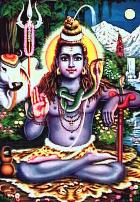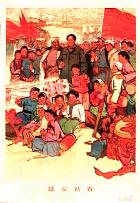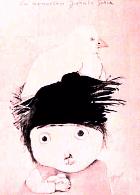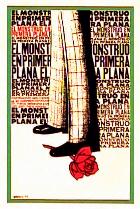As time went by, I dreamed about going back to Warsaw some day,
but Poland was shut off from the West during the next few years.
When it opened up again I could not resist any longer, and during
one Easter holiday I drove to Warsaw to visit this poster shop
again. I had to wait two hours at the east german border, another
five at the polish border, and when I finally arrived in Warsaw,
I found out that the shop had disappeared! Feeling quite foolish,
I decided to look up the address of the designer Starowieyski
in the phone book and ask him for help, only to discover that
there were no phone books in Warsaw.
I managed to find him somehow in the end, but he told me that
just knocking at the door of somebody without any introduction
and asking for posters, was not exactly polite behavior, particularly
not on an Easter Sunday morning. But polish hospitality prevailed,
of course, and during the next few hours Franciszek Starowieyski turned out
to be one of the most fascinating persons I have ever met.
On the desk where he designs his posters lies a skull.

3 La balade du grand macabre, play by M. de Ghelderode
Franciszek Starowieyski *1930
Poland, 1965
From then on, I visited him every year, usually in early May,
and when Chernobyl exploded on April 26th in 1986, he asked me
to bring some milk from Switzerland for his children as he was
afraid the milk in Warsaw might be contaminated.
The next poster is a comment on the Chernobyl accident from two
designers living in Kiev, 80 km away. The connection is not immediately
apparent for west european eyes, but it needs no explaining for an
Ukrainian: The gas mask of little Jesus is the type worn by the
so-called liquidators, the people who had to cleanup the mess,
a dangerous job that many have not survived. The text at the bottom
is a quote from the ubiquitous national poet Taras Shevchenko.
This poster which looks at first sight like a harmless visual
joke is in truth political dynamite, that could well have endangered
the career of its creators at the time. No wonder it is not signed. In the
Soviet Union of 1988, the red color was the exclusive domain of
the Communist Party (as for example in poster 12 and 14), religious
symbols were not tolerated in posters, not even Christmas trees,
and the ambiguous quote would alarm even the sleepiest censor.

4 Chernobyl poster with quote from Taras Shevchenko "You
will tell it to the people once you are grown up, son"
Vitalii Shostia *1942 and Zhanna Kravchenko *1945
Ukraine, 1988
Meanwhile, back in Basel, I became involved in a strategic
planning team that had to forecast the future of our activities
until the year 2000 and went to Copenhagen to interview one of our customers
about this. While walking back to the hotel, I was surprised
by a thunderstorm and found shelter from the rain in an antique
shop. Much to my surprise they sold indian posters of the same
type I had seen in India 16 years ago, and again I could not resist
and bought what they had, and from then on I was also including
indian posters in my dreams. Some years later, India was the guest country
of the Frankfurt Book Fair, and I thought my day had
come and I would meet dozens of indian publishers there and bring
back a carload of posters. Of course I found all kinds of things
in Frankfurt, like czech and german posters

5 Bluthochzeit, Opera by W. Fortner, based on a play by Federico Garcia Lorca
Holger Matthies *1940
Germany
but the indian publishers just shook their heads in utter disbelieve
about my requests.
Fortunately I also met a yellow robed Hare Krishna guru, a swiss
guy from Zurich by the way, who said he could bring me what I
wanted as he was frequently flying to India, and he would deliver
it to my home. I was rather scared and thought he was the type
of sectarian missionary you never get rid of again, but over the years we
have become good friends and each year my collection of indian
posters is growing by as much as he can carry on his trips to India.

6 Shiva in the Himalayan mountains
V. Krishnamoorthy
India, ca. 1990
The next story starts with a trip to a conference in England.
I got stuck in London, wound up in a chinese bookstore,
found nothing but chinese books, but as I was leaving the shop
I noticed that they had covered the wall above the door with a
poster. What happened then should be clear by now. At the conference
I accidentally run into a chinese colleague who had worked during some
time in my lab in Basel,
and I proudly showed him my bounty from London. Instead of sharing
my joy as I expected, he was shocked and disgusted. How could
I spend money on posters shamelessly praising the evil deeds of
the Gang of Four? He only calmed down a bit when he discovered
one poster among the many with a poem by Mao whom he admired deeply.

7 Mao Zedong celebrates the new spring with peasants from
Yan'an
unknown designer
Peoples Republic of China, 1965
When my polish friends heard about the chinese posters they became
quite excited as they had never seen one before and suggested
that I have an exhibition in Poland. They organized a hall at
the National Ethnographic Museum in Warsaw, I wrote a catalogue
and they commissioned a poster for the
exhibition, by Jerzy Czerniawski, the designer of poster 2. All
of this flattered me enormously. However the exhibition stood
under an evil omen. The first sign of trouble was that the censor
didn't like Czerniawski's design, showing a chinese farmer wearing
a big round straw hat so you could see only his pipe sticking
out from under it. It was meant to say that most of what is happening in China
is hidden from us and we know only very
little about it. The censor however thought it was
propaganda for opium smoking and he would have none of that. It
gave me a taste of life under a dictatorship. Then, three days
before the opening, I received a telegram from the Museum saying
that much to their embarrassment the exhibition could not take
place. Shortly afterwards, my friend Janusz Gunia who had looked
after all the details in Warsaw died in a car accident. The lithuanian
designer Stasys Eidrigevicius, who was a good friend of Janusz,
later made a poster in his memory.

8 In memoriam Janusz Gunia
Stasys Eidrigevicius *1949
Poland, ca. 1990
More and more, many of my colleagues became aware of my double
life and the next two posters are witness to the treasures they
started to collect for me. The first one is from an
old Cuba hand who made frequent trips to Havana to promote our
products there, and on my suggestion opened his eyes a bit more than usually.

9 El monstruo en primera plana, french-italian movie poster
Antonio Fernandez Reboiro *1935
Cuba, 1973
For the next poster, I have two versions on how I got it, one
is a bit more poetic, the other one may be a little bit closer
to the truth. First my favorite version: I had my office for some
years in one of these buildings where each floor
looks exactly identical to all the others. One day I must have
pressed the wrong button in the elevator, got out on the
wrong floor without realizing it and as I thought I was walking
towards my office I suddenly saw a huge expensive steel case with
sliding drawers standing in front of it, quite obviously a poster
storage cabinet, and it was not even locked. It was the thrill
of my life. I thought I had been promoted to Chief Poster
Archiver or whatever, or somebody wanted to get rid of his poster
collection, or even that I had been run over by a car on my way
to work, and was now in heaven. I finally realized
my mistake and located the owners.
When I explained to them who I was
and what I wanted they were very nice and let me have lots of
their publicity material.
While that story is true, it is more likely that this particular
poster is from a colleague, who
for many years has been a reliable forwarder of all kinds of beautiful
paper that crossed his way.

10 Poster for plant protection products, in farsi,
for Iran
CIBA-GEIGY Werbeabteilung
Switzerland, ca. 1985
After moving out of this marvelous place to another building
in 1993, I often had to deal with a computer system with the acronym CESAR.
This system would not accept users that did not have a given name
beside the family name, so it was called Julius Cesar. Never
before or after did I receive weekly electronic mail signed with
such an illustrious name. The designer of the poster, Wieslaw
Walkuski from Warsaw, is one of the few polish poster artists
who has survived the revolution of 1990, and also one who has
not been seduced by the possibilities of graphic design by computer
or modern printing technology, and from the poster it is easy to see why. Most
of his contemporaries have lost their jobs and have simply vanished.
Movie posters have been replaced by international versions with
polish lettering. Theaters would not have the money to print posters
if it were not for the tourist trade that would buy them as souvenirs.

11 Juliusz Cezar, tragedy by W. Shakespeare
Wieslaw Walkuski *1956
Poland, 1994
While a handful of the most gifted artists have made it in Poland,
the situation in the former Soviet Union is much worse. Not even
widely respected top designers like Viktor Kundyshev from St.
Petersburg, who during all his life was used to win prizes in
international competitions, now have work. He is too old to adapt
his style to package design for shoe boxes or instant soup. Apart
from the psychological stress of not being able to use his creative
talents and to see a lifetime of achievements now being ridiculed,
he is threatened with sheer economic misery. There is no comfortable
early retirement plan for Viktor Konstantinovich.

12 Leningrad - Petrograd
Viktor Kundyshev *1933
Russia, 1983
The theater poster by the young german professor Henning Wagenbreth
- the first poster designer I knew with an electronic mail address
- is a bit of advice to my younger colleagues. Although
I am not familiar with the play by Goldoni, and Wagenbreth depicts
the situation as rather stressful, I would strongly recommend
not to put all your eggs in one basket and arrange your career
so that you always have at least two masters, or at least two
jobs. It has worked well for me. While doling out advice on how
to live happily, I might just as well mention that this beautiful
poster can be bought at the theater in Bonn for 3 DM, and that
it is generally good practice that whenever you are in a foreign
city to go to the theater and ask for posters. Use the back entrance
and they will think you belong to the club. And now one last,
but essential word of advice: If you get some and don't know what
to do with it, send it to
!

13 The servant of two masters, comedy by C. Goldoni
Henning Wagenbreth *1962
Germany, 1994
I conclude with a poster by Georgii Shevtsov from Kiev, whom we
visited last November, because I like it, and I like him. Ignoring
the political rhetoric at the top, it seems to me that the young
man is ready to open his clenched fist to wave good-bye to a past,
with some sadness, but also hope and determination for the future.

14 Proletarians of all countries, unite!
Georgii Shevtsov *1940
Ukraine, 1983
Finally, I want to thank everybody who has sweetend my life
during the last twenty years, poster artists, my family, my friends
and my colleagues !
go back to main page
page last revised on August 21, 1997
/

